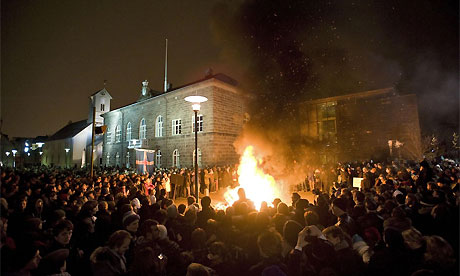
When Iceland's ruling coalition dissolved in January in response to a spontaneous popular revolt against the politicians who had permitted our country's financial system to collapse, it was widely assumed that the new elections would usher in an era of genuine change.
Unfortunately, in Iceland, as elsewhere, we're numbed by the continuous stream of bad economic news and appear in danger of forgetting what we were fighting for. Our white-hot fury against the architects of our ruin appears to have cooled, and the very same professional politicians who ran the country during its fall are still controlling the debate, and will almost certainly dominate the new parliament following the April 25 elections.
Sure, the most polarizing figures--former Prime Minister Geir Haarde, former Foreign Secretary Ingibjörg Sólrún Gísladóttir, and Central Bank chairman Davíð Oddsson--are gone, but their successors are carrying on their policies without missing a beat.
 The fire seems to have gone out of Icelandic protesters, here in front of Alþingi, the Icelandic Parliament last January. Photo credit: Halldór Kolbeinsson.
The fire seems to have gone out of Icelandic protesters, here in front of Alþingi, the Icelandic Parliament last January. Photo credit: Halldór Kolbeinsson.
Until the kreppa hit, Iceland was generally considered by outsiders to have one of the least corrupt governments in the world. Unfortunately, it appears that our government was no better than any of the other banana republics. Government jobs and contracts were awarded on the basis of kinship, back room deals were made that would obligate future generations to subsidize foreign corporations, and laws were passed to ensure that a cult of strict secrecy would keep us peasants from learning any of the details.
We don't know the terms of the IMF's agreement to run our country's finances. We don't know the truth in the rumors of multi-million dollar fund transfers out of the country immediately before the banks' collapse. We don't know how much Alcoa is paying us for the electricity that runs its aluminum smelters (critics say it is 1/3 of what it pays to run its smelters in US and Europe).
Astonishingly, none of the traditional political parties have pushed for any of this information. Although a popular television host (it took a private citizen to shame the government into asking for outside assistance) was able to convince Eva Joly--a world-renowned corruption fighter--to aid in the investigation of the banks' collapse, the issue did not come up at all during the candidates' first debate. Although a documentary detailing Alcoa's apparent rip-off of our natural resources debuted to record audiences in Iceland this past weekend, the Independence Party chairman's has promoted additional smelters as the solution for what ails us.
Instead, the political debate has centered almost exclusively on what the candidates plan to do to get us out of our current situation. You would think that the conditions imposed by the IMF might limit our future options, or that recouping some of the billions lost in the crash might alleviate our suffering, or the long-term debt we incurred building the hydroelectric projects that power the smelters might have some relevance, but apparently not.
The reporters, the debate moderators, asking the questions (and setting the national agenda) seem to think that the only questions worth asking are ones that focus on quick fixes - and can be answered in three words or less.
Each party promises a magic bullet--aluminum plants (Independence Party), EU membership (Social Democrats), green energy (Left Green). Just choose a door, and all the bad things will disappear.As I noted when the interim Fisheries Minister--who happens to be the leader of the Left Green party--approved his predecessor's decision to permit the "harvesting" of a few hundred whales, the new boss is pretty much the same as the old boss. The interim government did push through a lot of necessary legislation, but they've taken their eye off the ultimate prize. There were promises of a constitutional convention back in January and February, but they, too, have been swept under the rug (thanks to the Independence Party, which seems to abhor any ideas of "power to the people").
Yes, Iceland's in a really bad situation right now, but we're not starving or anything like that. Not yet, anyway. Yes, the probable government--a coalition of the Social Democrats and Left Green parties, led by Johanna Sigurdardottir--will certainly be better than the old government. The Citizens' Movement, a political coalition, born out of the "Pot and Pan" Revolution and the only party proposing to treat the source of the pain rather than its symptoms, will probably get a seat in Parliament.
But I had hoped for so much more back while the fires were still burning.
